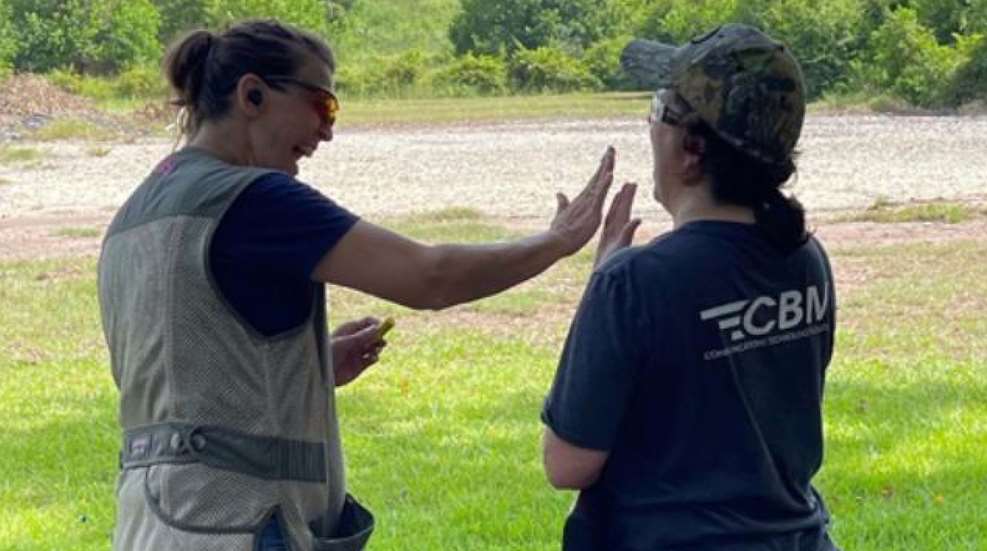5 Common Mistakes Firearms Instructors Make
Tags: NRA, 2nd Amendment, Training, NRA Women, Instructor, Range, Firearms

5 Common Mistakes Firearms Instructors Make – NRA Women.com
NRA Firearms instructors are the best of the best–now here’s how to stay that way!
When conducting NRA Firearms Training classes, always be on the lookout for techniques, methods or the lack thereof that might affect the quality of the course you are teaching. Whether you’re a brand-new instructor or one who has been teaching for years, there are five common mistakes that can creep into your class and deny your students the experience they deserve from an NRA Firearms Training course.
Death by PowerPoint
Painful. That is the way most students describe any course or training class that that they attended that relied too heavily on PowerPoint. Training aids, guest speakers and additional handouts all can break up the monotony of a PowerPoint. Supplementing the required NRA Training PowerPoint with these teaching tools can make your class more memorable. Get creative. Leave your students with the feeling that they got their money’s worth. These courses are not cheap, so do not conduct them cheaply.
Rushing at the Range
Believe it or not, this is the most common complaint I hear from students. You are teaching a Basic firearms training course, so it would stand to reason that the range component should be one of the most important parts of your course. Take your time at the range. This is where many of your students need the most help or practice. Your NRA Basic students need to learn the basics as prescribed by the NRA. Your NRA Instructor students need to learn the very precise methods of the NRA to teach their future students. Be aware that many students are shy about letting you know when they don’t understand something or feel they need more time.
Lack of Training Aids
Training aids serve a very important purpose in your class. They help your students visualize what you are saying. Anything can be a training aid. They can be very expensive, such as actual firearms, either functioning or non-functioning, or as inexpensive as cutting out paper or cardboard to resemble the front and rear sights of a rifle or handgun, demonstrating how to line them up for proper sight alignment. You can tell students how to line up the front and rear sights and you can show Power Point slides on how to line up the sights, but actually showing how to line up the sights with cut outs can really tie everything together.
Students want hands-on training aids. Getting to know your local gunsmith is a great way of obtaining training aids. Blown barrels and inoperable guns are easy to obtain from these resources. Sometimes they will just give them to you, or offer them for sale at a very reasonable price.
Remember that you, too, are a visual aid. That is why in class, instructors must model the behavior they expect from their students. If we fail to keep our finger off the trigger until we are ready to fire, our students will do the same. If we fail to keep our muzzle pointed in a safe direction, our students will do the same.
Stressing Failure Over Success
When you are conducting NRA Basic Firearms Courses or NRA Instructor Firearms Courses, you are continually assessing or testing your students, either formally or informally. We assess our students from the informal act of observing a student’s attitude, to the formal act of taking a scored written test. Our assessment even includes having our students read specified PowerPoint slides, an NRA instructional concept known as “Total Participant Involvement (TPI).”
That said, if you are constantly telling your students that they are being tested and observed, you are basically telling them they could fail the class at any point during the training process. Even though this is true, do you really need to keep reminding them? If there is a student failing in one of these areas, could it be dealt with on a one-on-one basis to keep the class positive?
Instructors need to understand that in public speaking, how you say things or the phrases you use can set the tone for your class. Is the glass half empty or half full? You really need to focus on the words you use. Instead of saying “You need a score of 80 percent on the written test,” could you say,” You only need a score of 80 percent on the test to pass the course?” Instead of saying “You must demonstrate a thorough knowledge of the subject matter to pass the course” could you say, “By the time you complete the course you will have a thorough knowledge of the subject matter?” You can see how just changing a word or two can change the tone of the class.
Not Re-Investing in Your Business
Always be thinking how you can make your class better. Starting out as a new NRA Firearms Training Instructor you might have all new equipment, great training aids and a newly built gun range … but it is easy to get complacent and let time slip by without updating your class.
Probably the most important factor in the minds of your students is comfort. For example, at the current location where I teach, there is no covered area near the shooting area. In most parts of the U.S. that might be a minor inconvenience, but in Texas, shade is essential. I was so caught up in teaching and keeping everyone safe and involved on the range that I never thought how I could make the range more comfortable to my students until one day a student asked me, “You want me to go get my pop-up canopy out of my truck?” That night I went to the local sporting goods store and bought four canopies!
Do not forget to keep your class current. Do you keep abreast of the newest trends? When I began teaching, AR platforms were not as common as they are today. By 2019, that all changed. I asked myself, “How can I teach an NRA Rifle Course without a modern sporting arm?” I spent $900 on a rifle just so I can offer my students the class they deserve.
